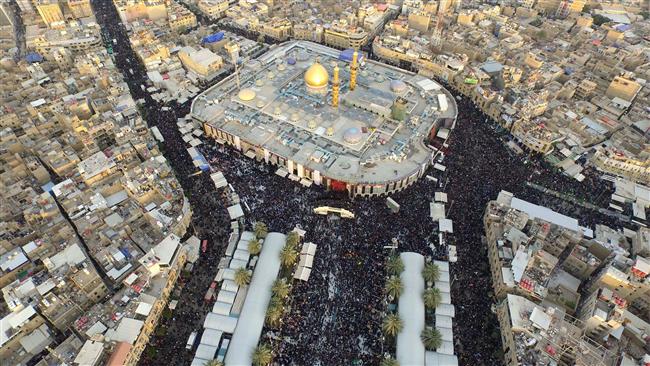Millions of pilgrims gathered in Iraq's holy city of Karbala amid tight security on Wednesday to mark Arbaeen, the annual commemoration of the end of the 40-day mourning period after the seventh century martyrdom of a central figure in Shiite Islam.
Many made the pilgrimage on foot from the Iraqi capital, walking along roads lined with blast walls and razor-wire, and waiting at checkpoints to be frisked by security forces. Soldiers and police also mingled with the pilgrims, most of whom wore black out of mourning.
Iraqi officials said security was increased this year, with operations coordinated between the Interior Ministry, Shiite militias and Iranian advisers. The Islamic State group has repeatedly targeted Iraq's Shiite majority, viewing them as apostates deserving of death.
Iraqi state-run media said Wednesday that more than 22 million pilgrims have visited Karbala, setting a record for the annual pilgrimage. That number could not be independently verified. Iraqi authorities said last year's Arbaeen drew 17 million pilgrims.
Arbaeen commemorates the end of the 40-day mourning period after the killing of Imam Hussein, the Prophet Muhammad's grandson, in a climactic battle in A.D. 680 that cemented the rift with Sunnis.
The faithful traditionally walk for a day or longer to reach Karbala where crowds chant and march around the Imam Hussein shrine. The holiday is observed in Shiite communities worldwide, with large gatherings in Iran and southern Lebanon.
On the walk to Karbala, which can take up to two days, pilgrims said security was the main topic of conversation, closely followed by politics.
"We are commemorating the death of Imam Hussein, who led a revolution for reforms," said Ali Tahir, a pilgrim from Baghdad. "We are facing the same problem now, which is corruption and lack of services. The current government pays no heed to the people."
Murtada Ahmed, 23, who walked to Karbala from Baghdad with friends, spoke with disdain about the passing convoys of SUVs with blacked-out windows, the preferred mode of transport for the country's political elite.
"They don't even bother themselves to walk," Ahmed said. "They just stay in their cars and really just annoy the rest of the pilgrims."
Last summer saw mass protests across Baghdad and the mostly Shiite south over the failure to provide basic services, including frequent power outages amid a sweltering heat wave.
The IS group controls large parts of northern and western Iraq, including the city of Ramadi, some 90 miles (140 kilometers) north of Karbala. On Monday, a suicide bomber targeted pilgrims in Baghdad, killing nine people and wounding another 21, according to Iraqi security officials.
A special task force of Shiite militiamen has been deployed to Karbala to provide extra security, said Hashim al-Musawi, a spokesman for the umbrella group of militias known as the Popular Mobilization Forces. He said Iranian advisers are also on hand to coordinate security.
"We have a joint operations room," al-Musawi said. "It enables the Iranian advisers who have expertise in the field of security to help protect the visitors."
The Shiite militiamen and Iranian advisers have played a key role alongside Iraqi security forces in battling the IS group. Many pilgrims carried the flags of the various militias on the march to Karbala.
"Of course we are not afraid," said Ahmed al-Ta'ii, who walked to Karbala from his home in Baghdad's Kazimiyah neighborhood with his nine-year-old son. "The security is 24 hours and every year it's increased. Why should I be scared?"
Besides, he added, if anything happens, "we will just go to paradise."
/149

